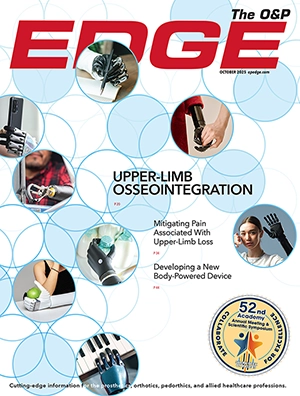The Orthotic and Prosthetic Assistance Fund, OPAF, http://www.opfund.org,
offers the following information in cooperation with Mary Anne Schofield,
Ph.D. of Villanova University as a public service announcement, PSA, that
helps to fulfill OPAF’s official representation of the fields of orthotics
and prosthetics in community and philanthropic circles.
************************
In 2005, OPAF PSAs and overall operations are made possible thanks in part
to the generosity of OPAF’s top current supporters, including the American
Board for Certification in Orthotics and Prosthetics, ABC,
http://www.abcop.org/; Morrison & Foerster LLP http://www.mofo.com/; and
Ohio Willow Wood http://www.owwco.com/.
Thanks to all for their commitment to OPAF’s chief mission: enable
individuals with physical disabilities — especially those served by members
of the U.S. O&P community — to enjoy the rewards of personal achievement,
physical fitness, and social interaction.
Every PSA helps to build a bridge between OPAF, and therefore the O&P
community, and individuals and organizations concerned with the past,
present, and/or future of orthotics and prosthetics. Alongside OPAF’s other
service programs, OPAF PSAs help to advance the abovestated mission while
promoting, enhancing, and protecting the reputation of O&P in the public
eye.
Learn more about OPAF at http://www.opfund.org and see our thanks to all
OPAF supporters at:
http://www.opfund.org/thankyou2005.htm.
*****************************************
Call for experiences from caregivers of World War II veterans
Mary Anne Schofield, Ph.D. of Villanova University invites essays for
inclusion in her edited volume TAKING CARE OF THE GREATEST GENERATION:
Personal Reflections by the Caregivers of World War II Veterans. Dr.
Schofield teaches Core Humanities at Villanova University in Pennsylvania.
Learn more Dr. Schofield here: http://www.fsu.edu/~ww2/taking_care/bio.htm,
and about her book here: http://www.fsu.edu/~ww2/taking_care/. Dr. Schofield
may be reached at mary.anne.schofield @villanova.edu
Wanted – Written experiences from other primary care-givers of WWII
veterans, which might include: Writing your war stories; Learning to care
for elderly parent; Making decisions: Home Health Care versus Nursing Home;
Using the VA’s services or not; Defining gender issues & decisions;
Arranging funeral services: military or not?
Growing up in the fifties and the sixties, I knew that my Dad was a
veteran—Mom always said he was special, for he was a veteran of two wars:
World War II and the Korean War. He was not career Army, but when called up,
had transferred his business talents–running a railroad transportation
company–into his patriotic skills and headed two railway operating
battalions for Uncle Sam. Duty done, he returned to his position with the
Pennsylvania Railroad, his wife and me, his daughter. He lived his life. And
until his eighty-second year, it was a good one. In 1996, his wife of
fifty-five years died, and my father’s world changed forever, as did mine.
For the next four years, I became my dad’s primary care-giver; I had already
taken care of my mother. I found the situation very different, for Dad was a
veteran; Mom was not. I found myself making different decisions in terms of
their care.
My experiences parallel many of my baby-boomer generation, for we have taken
care of or are in the process of taking care of our parents, members of the
greatest generation, the only generation to have truly saved the world!
Historians, scholars and the like will argue that World War II was the last
time that we as a nation were yoked together in a common cause; it was a
people’s war, as Angus Calder has named it. The war, it is argued, brought
out the best in people. And no one was exempt: everyone had a patriotic duty
to perform. Well, that duty continues today into the twenty-second century
as we children of these fighting men and women now find ourselves caring for
them in their final battle. Oftentimes, no longer in a commanding position,
it is the children who make the final decisions about their last great
campaign. This collection of letters charts the decisions that were made and
are being made to honor these heroic people for the last time.
I would argue that different decisions are made when caring for an elderly,
veteran parent rather than a non-veteran parent. The obvious choices come to
mind whether or not to use V A facilities, prescription drug programs, and
the like. But I think the decisions are more far reaching. Addressing these
issues, the book is divided into the following sections: (1) Fifty years
later–hearing the true war stories; (2) Learning how to live with an
elderly hero(?); (3) Making decisions for one who previously had made the
decisions; (4) Home Health Care versus Nursing Home Care; (5) Using the VA’s
services; (6) Gender issues and decisions; and (7) Funeral
Arrangements–military or not?
Tom Brokaw writes in the introductions to both his The Greatest Generation
and The Greatest Generation Speaks that both books were his way to say thank
you. “I wanted that book to be my gift to them, an expression of admiration
and gratitude for all they achieved, and for the legacy they passed on to
future generations” (Speaks xx). I, too, want to say thank you and give us
all a chance to say the same. TAKING CARE OF THE GREATEST GENERATION is the
way to do so.



